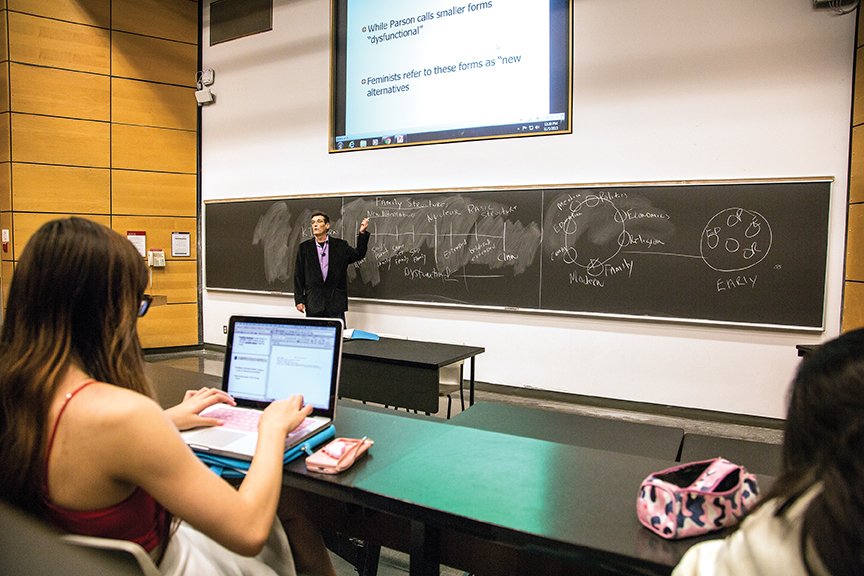After adapting to remote learning and testing, the transition to hybrid or in-person tests, midterms, and exams, may seem overwhelming. With some practice and by trying new study strategies, you will be ready in no-time to succeed in writing your in-person tests in university!

Testing in University
In university there are four main types of tests you will experience: quizzes, tests, midterms, and exams. What is the difference between them?
Quiz: A quiz is short in length, often between 20 and 30 minutes and will require you to demonstrate a brief understanding of the course material. Quizzes may contain information from only one lecture, or from a few consecutive lectures and readings. Quizzes often will be in the format of multiple choice, and you will be expected to recall from memory small details from lecture or readings.
Test: A test will be longer in length than a quiz, but less demanding than a mid-term. Tests often require you to study material from both lecture and readings and will combine multiple weeks of teachings (often one to 3 weeks of course material). Tests often range in length from one to two hours, and will require you to demonstrate more connections to the big-picture learning in the course.
Midterm: A midterm is somewhere in-between a test and an exam because it will require you to demonstrate your understanding of the course through making connections between multiple weeks of course readings and lectures, but it may not be as intensive as an exam. Midterms often require you to recall knowledge from half a semester worth's of teachings and can vary in length. Midterms are typically written during regular scheduled class hours and will combine your knowledge of details (formulae, key terms, key concepts, events, dates, names) with your understanding of how course themes connect (bigger picture understanding of course objectives).
Exam: An exam is a more in-depth and longer test or midterm, that is often scheduled at the end of the term either during class hours of during the exam period (which begins after the last day of classes). Exams are often 2 to 3 hours in length and require you to demonstrate an in-depth understanding of both course concepts and how they connect to the course objectives (found in the syllabus). Exams may be cumulative, which means that you are required to study and demonstrate your knowledge from the entire semester, not just a few week's worth as other tests require you to. To prepare for the exam, you can use your experience of the type of questions and the content of question in quizzes, tests, and midterms that you have completed during the term.
Open vs. Closed Book Tests

Many online midterms or exams will allow you to write an "open-book" test, which means that you are allowed to use your textbook, notes, formulae sheet, and any other course materials while writing the test.
In-person exams are most often "closed-book" tests, unless your professor explicitly tells you otherwise, which means you will need to recall from your memory and understanding any information you need to complete the test or exam. In order to maintain good academic integrity, it is very important that you ask your professor before you prepare and write the exam, if your exam is "open" or "closed-book".
While both methods of test-writing require study and preparation, testing that is not "open-book" will require you to be creative with your memorization strategies so that you are prepared to complete your test to the best of your abilities without the aid of notes.
If you're ever unsure which format your test or exam will be, ask!
Time Management
During your in-person exam, set time-based goals based on the amount and weight of the questions provided and the amount of time you have to write the exam! For example, if the first section of the exam is worth 30% but the second portion is worth 70%, you will want to allocate more time to work on the second section than the first.
Remember to always leave yourself at least 5 to 10 minutes to review your test or exam at the end to check for spelling, punctuation, grammar, and any mistakes, or questions you skipped over the first time.
Staying Concentrated
When writing tests online or completing "take-home" assignments, it can be easy to find ways to take mental and physical breaks from your assignments. In-person tests, midterms, and exams will not allow you to leave the classroom other than for a bathroom break. So, how can you stay focuses for 3 hours when writing a long and in-person exam?
Stretch - Try your best to keep a healthy posture when sitting in one place for a long period of time. Once in a while, take a moment to stretch while staying in your seat and keeping your focus (eyes) on your own test paper. You can roll your head around in a circular motion, roll your shoulders back, and wiggle your feet to keep your blood flowing and have a small but not distracting movement break.
Breathe - Don't forget to breathe! Take a moment to quietly inhale and count to three in your head, hold your breath for a moment, and exhale while counting to three in your head. Try and set small reminders for yourself each section or page to take a small breather!
Move on - In an in-person exam, often you will be writing on a piece of paper with a pen or pencil which means that you have the ability to chose the order that you complete your questions in. If you are stumped on a question and feeling frustrated, it's okay to move on to a new question and come back to the tricky question after! Allowing yourself some flexibility in the order your work in will help you to stay focused and manage your time.
How to Prepare

Many students struggle with test anxiety because they place a lot of pressure on themselves to succeed, often thinking that one test or exam will determine their entire grade and future.
Reflect - Try to keep the big picture in mind. Tests and exams do not determine your intelligence, they are just tools professors use to determine how much information you have retained from the course. Remember that your grade is determined from a combination of many tests and assignments, you have time to improve your grade with healthy study habits, if that is your goal.
Ask - Ask you professor, TA, or classmates for help! Often professors will give you hints or study guides to let you know which topics will be important to understand for your test, midterm, or exam. They want you to succeed, it is okay to ask for help! Try studying or discussing with your classmates which topics and ideas you think will be on the test or exam so you can prepare accordingly.
Test Yourself - Help to reduce test anxiety by preparing test questions for yourself in the same format that your midterm or exam will be. This will physically and mentally prepare you to complete the real test or exam! Try to create questions that are harder than you would find on an exam, and practice completing your made-up questions within a similar amount of time as you will be given to write the real exam.
Understand First - Memorizing will only get you so far, and if you are writing an in-person "closed-book" exam, you will need to remember a lot! Understand the material first so that you are able to explain in your own words how concepts connect within your course, and this basis of understanding will make remembering the fine details much easier.
Learn from Experiences - All you can do is your best! Learn from each test experience and reflect on which study strategies helped you to succeed, and what you would like to try differently for your next test.
